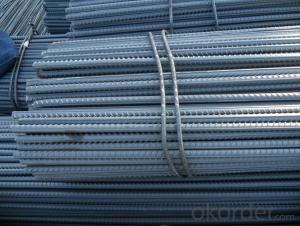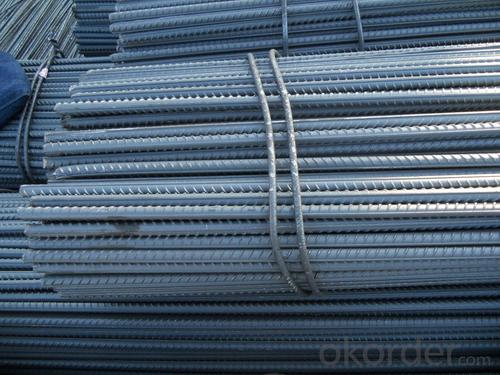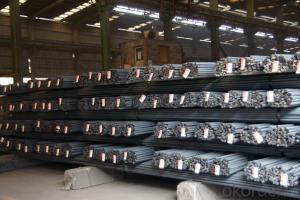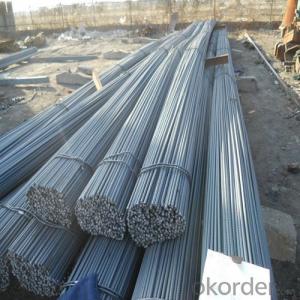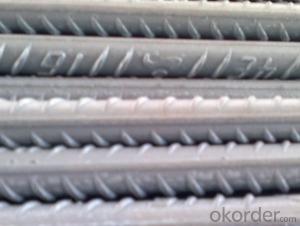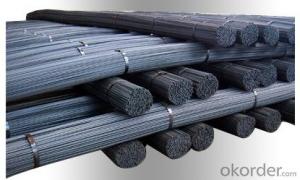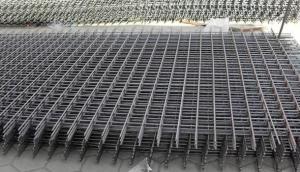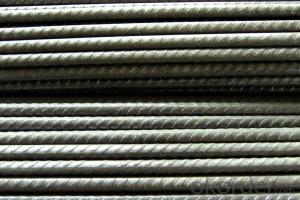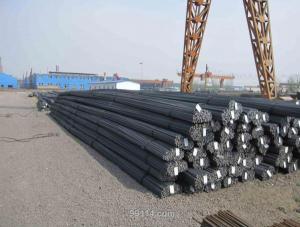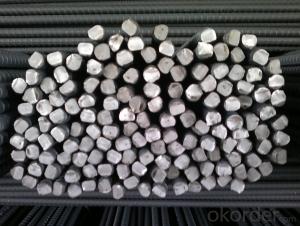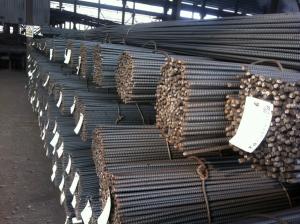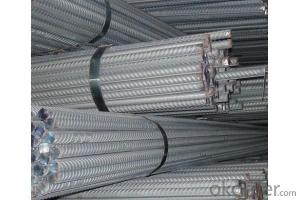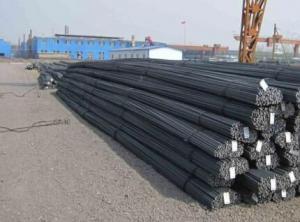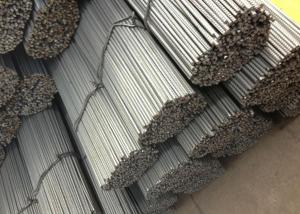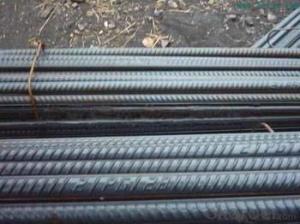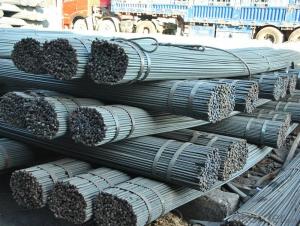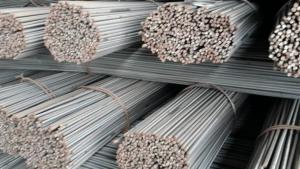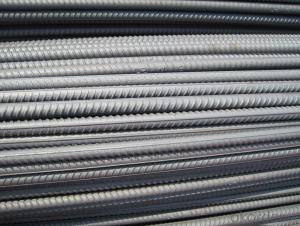Reinforcing Deformed with high quality Steel Bars
- Loading Port:
- Tianjin
- Payment Terms:
- TT or LC
- Min Order Qty:
- 50 m.t
- Supply Capability:
- 20000 m.t/month
OKorder Service Pledge
OKorder Financial Service
You Might Also Like
Product Description:
OKorder is offering Reinforcing Deformed with high quality Steel Bars Building Material China Manufacturer at great prices with worldwide shipping. Our supplier is a world-class manufacturer of steel, with our products utilized the world over. OKorder annually supplies products to European, North American and Asian markets. We provide quotations within 24 hours of receiving an inquiry and guarantee competitive prices.
Product Applications:
Reinforcing Deformed with high quality Steel BarsBuilding Material China Manufacturer are ideal for structural applications and are widely used in the construction of buildings and bridges, and the manufacturing, petrochemical, and transportation industries.
Product Advantages:
OKorder's Reinforcing Deformed with high quality Steel Bars,Building Material China Manufacturer are durable, strong, and resist corrosion.
Main Product Features:
· Mill test certification
· Professional Service
· Competitive pricing
Product Specifications:
HRB400 Deformed Steel Bar Details:
Minimum Order Quantity: | 25MT | Unit: | m.t. | Loading Port: | China Main Port |
Supply Ability: | 800000TONS/YEAR | Payment Terms: | TT or LC |
Product Description:
Specifications of HRB400 Deformed Steel Bar:
Standard | GB | HRB400 | |
Diameter | 6mm,8mm,10mm,12mm,14mm,16mm,18mm,20mm, 22mm,25mm,28mm,32mm,36mm,40mm,50mm | ||
Length | 6M, 9M,12M or as required | ||
Place of origin | Hebei, China mainland | ||
Advantages | exact size, regular package, chemical and mechanical properties are stable. | ||
Type | Hot rolled deformed steel bar | ||
Brand name | DRAGON | ||
Chemical Composition: (Please kindly find our chemistry of our material based on HRB500 as below for your information)
Grade | Technical data of the original chemical composition (%) | ||||||
C | Mn | Si | S | P | V | ||
HRB400 | ≤0.25 | ≤1.60 | ≤0.80 | ≤0.045 | ≤0.045 | 0.04-0.12 | |
Physical capability | |||||||
Yield Strength (N/cm²) | Tensile Strength (N/cm²) | Elongation (%) | |||||
≥400 | ≥570 | ≥14 | |||||
Theoretical weight and section area of each diameter as below for your information:
Diameter(mm) | Section area (mm²) | Mass(kg/m) | Weight of 12m bar(kg) |
6 | 28.27 | 0.222 | 2.664 |
8 | 50.27 | 0.395 | 4.74 |
10 | 78.54 | 0.617 | 7.404 |
12 | 113.1 | 0.888 | 10.656 |
14 | 153.9 | 1.21 | 14.52 |
16 | 201.1 | 1.58 | 18.96 |
18 | 254.5 | 2.00 | 24 |
20 | 314.2 | 2.47 | 29.64 |
22 | 380.1 | 2.98 | 35.76 |
25 | 490.9 | 3.85 | 46.2 |
28 | 615.8 | 4.83 | 57.96 |
32 | 804.2 | 6.31 | 75.72 |
36 | 1018 | 7.99 | 98.88 |
40 | 1257 | 9.87 | 118.44 |
50 | 1964 | 15.42 | 185.04 |
FAQ
Q1: How do we guarantee the quality of our products?
A1: We have established an advanced quality management system which conducts strict quality tests at every step, from raw materials to the final product. At the same time, we provide extensive follow-up service assurances as required.
Q2: How soon can we receive the product after purchase?
A2: Within three days of placing an order, we will begin production. The specific shipping date is dependent upon international and government factors, but is typically 7 to 10 workdays.
Q3: Why buy Materials & Equipment from OKorder.com?
A3: All products offered byOKorder.com are carefully selected from China's most reliable manufacturing enterprises. Through its ISO certifications, OKorder.com adheres to the highest standards and a commitment to supply chain safety and customer satisfaction.
Images:
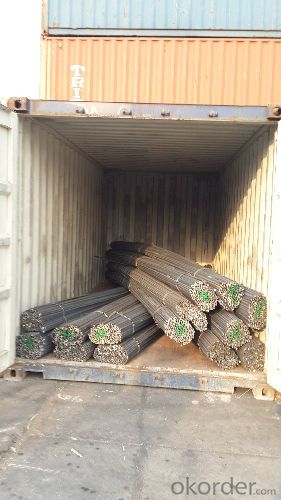
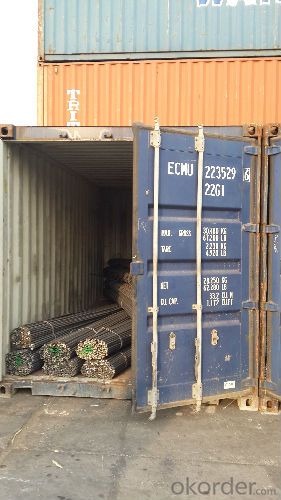
- Q: How do steel rebars impact the overall construction cost estimation process?
- Steel rebars can have a significant impact on the overall construction cost estimation process. They are a crucial component in reinforced concrete structures, providing strength and durability. The quantity and quality of steel rebars required for a project can influence the material cost, labor cost, and construction timeline. Accurate estimation of steel rebars is essential to ensure the project's structural integrity while avoiding cost overruns or delays.
- Q: How are steel rebars used in railway track construction?
- Steel rebars are used in railway track construction to reinforce the concrete sleepers or ties that support the tracks. They provide strength and stability to the tracks, ensuring they can withstand the heavy loads and constant vibrations of trains passing over them. The rebars are embedded within the concrete during the sleeper casting process, enhancing the overall durability and longevity of the railway tracks.
- Q: Can steel rebars be used in bridge deck construction?
- Bridge deck construction can utilize steel rebars. These reinforcement bars, also referred to as rebars, are generally composed of carbon steel and are employed to strengthen concrete structures, including bridge decks. Their application in bridge deck construction is widespread owing to their exceptional tensile strength and capacity to withstand heavy loads. To enhance the strength and prevent cracking, the rebars are positioned within the concrete deck. They function as reinforcements, ensuring even load distribution across the bridge deck, thereby augmenting its load-bearing capability and durability. The resistance of steel rebars to corrosion is crucial in bridge construction due to exposure to adverse environmental conditions such as moisture, salt, and temperature fluctuations. Furthermore, steel rebars offer versatility in design and construction, allowing for easy shaping, bending, and interconnection. This facilitates customized placement and reinforcement of the bridge deck, enabling engineers to optimize the design and meet the required safety and strength standards. In conclusion, steel rebars are a widely adopted and appropriate choice for bridge deck construction due to their impressive strength, resistance to corrosion, and design flexibility. They play a vital role in enhancing the structural integrity and lifespan of bridge decks, making them a reliable and preferred option in bridge construction projects.
- Q: How do steel rebars affect the constructability of a project?
- Steel rebars play a crucial role in the constructability of a project as they enhance the structural integrity, strength, and durability of concrete structures. By providing tensile strength to concrete, rebars help prevent cracking and ensure the overall stability of the project. Additionally, rebars facilitate the ease of construction by allowing for efficient reinforcement placement and alignment. Overall, steel rebars significantly contribute to the constructability and long-term performance of a project.
- Q: How are steel rebars protected from vandalism during construction?
- Steel rebars are generally protected from vandalism during construction through various measures such as fencing off the construction site, employing security personnel, installing surveillance cameras, and implementing access control systems. Additionally, some construction sites also use anti-vandal coatings or cover the rebars with concrete to make them less accessible and susceptible to damage.
- Q: Can steel rebars be used in tunnels or underground transportation systems?
- Tunnels or underground transportation systems can indeed utilize steel rebars. These rebars are frequently employed in construction projects, including tunnels and underground transportation systems, owing to their durability and high tensile strength. By providing reinforcement to concrete structures, they enhance their structural integrity and prevent cracking or collapsing. In underground environments where moisture and other corrosive elements may exist, the resistance to corrosion exhibited by steel rebars is particularly crucial. Moreover, steel rebars can be easily fabricated and installed, making them a practical option for construction projects with tight schedules. All in all, steel rebars constitute a dependable and widely utilized material in tunnels and underground transportation systems, ensuring the safety and durability of the structures.
- Q: What are the guidelines for spacing steel rebars in reinforced concrete?
- Spacing steel rebars in reinforced concrete structures can vary depending on factors such as structural design requirements, load-bearing capacity, and the size and shape of concrete elements. However, there are some general guidelines that can be followed to ensure proper spacing and reinforcement. 1. Rebar spacing: The recommended spacing between steel rebars in reinforced concrete is typically three to six times the diameter of the bars. For example, if the rebar diameter is 12mm, the spacing should be between 36mm and 72mm. This spacing allows for adequate concrete cover and allows the concrete to flow freely around the reinforcement, ensuring optimal strength and durability. 2. Minimum spacing: To prevent rebars from being too close to each other, minimum spacing requirements are in place. This is to avoid inadequate concrete cover and hindered flow of concrete during construction. The minimum spacing between parallel bars is generally specified to be around 25mm or more. 3. Maximum spacing: On the other hand, there are also maximum spacing requirements to ensure sufficient reinforcement and prevent excessive cracking or failure of the concrete structure. The typical maximum spacing is around 300mm, although this may vary based on specific design requirements and the size of the concrete element being reinforced. 4. Spacing around corners and bends: Special attention should be given to rebars' spacing around corners and bends in reinforced concrete elements. The spacing should be reduced in these areas to provide adequate reinforcement and prevent cracks or weak points. In general, the spacing around corners and bends should be less than the recommended spacing for straight sections. 5. Spacing in heavily loaded areas: In areas subjected to heavy loads or high-stress concentrations, such as columns, beams, or foundations, closer spacing of rebars is necessary to provide sufficient reinforcement. The spacing in these areas is typically reduced to ensure structural integrity and prevent failure. It is important to note that these guidelines are general recommendations, and specific projects may have unique requirements based on structural design and local building codes. Therefore, consulting with a structural engineer or following the specifications provided by the project's design professionals is crucial to ensure the proper spacing of steel rebars in reinforced concrete structures.
- Q: How do steel rebars contribute to the overall structural performance of a building?
- Steel rebars play a crucial role in enhancing the overall structural performance of a building. These reinforced steel bars are primarily used in concrete construction and provide strength and stability to the structure. Firstly, rebars reinforce the concrete by increasing its tensile strength. Concrete is highly resistant to compression forces, but it is weak when it comes to tension. By adding steel rebars, which have excellent tensile strength, to the concrete, the resulting composite material becomes much stronger and more resistant to bending or cracking under pressure. Moreover, rebars improve the durability and longevity of the building. Concrete structures are subjected to various forces such as wind, earthquakes, and heavy loads. Steel rebars act as a reinforcement network, distributing these forces throughout the concrete and preventing localized damage. This reinforcement helps to minimize the risk of structural failure, ensuring the building can withstand the test of time and environmental conditions. In addition, rebars contribute to the overall stability of the structure. By reinforcing concrete columns, beams, and slabs, rebars enhance their load-bearing capacity. This enables the building to support heavier loads without excessive deflection or collapse. The increased stability provided by the rebars also allows for more flexible and creative architectural designs, as they provide the necessary structural support for complex and unique building shapes. Furthermore, steel rebars are essential in seismic zones where earthquakes are common. The ductility and flexibility of steel allow it to absorb and dissipate the energy generated during an earthquake. This prevents the building from undergoing severe damage and helps it to retain its structural integrity, minimizing the risk to occupants. Overall, steel rebars significantly contribute to the overall structural performance of a building by enhancing its strength, durability, stability, and resistance to various forces. Their use ensures that the structure remains safe, long-lasting, and capable of withstanding the demands placed upon it, making them an indispensable component in modern construction.
- Q: What are the common myths and misconceptions about steel rebars?
- There are several common myths and misconceptions about steel rebars. One misconception is that all rebars are the same, when in fact there are different grades and types of rebars with varying properties and strengths. Another myth is that steel rebars are prone to rusting easily, but in reality, rebars are typically coated with protective substances or used in conjunction with concrete to prevent corrosion. Additionally, some people believe that steel rebars are not environmentally friendly, but they are actually highly recyclable and can be reused in various construction projects. Overall, it's important to dispel these myths and understand the true characteristics and benefits of steel rebars in construction.
- Q: What is the average lifespan of steel rebars in marine environments?
- The average lifespan of steel rebars in marine environments varies depending on several factors such as the quality of the steel, level of exposure to saltwater and other corrosive elements, maintenance practices, and design considerations. However, with proper corrosion protection measures and regular maintenance, steel rebars in marine environments can typically last around 30 to 50 years.
Send your message to us
Reinforcing Deformed with high quality Steel Bars
- Loading Port:
- Tianjin
- Payment Terms:
- TT or LC
- Min Order Qty:
- 50 m.t
- Supply Capability:
- 20000 m.t/month
OKorder Service Pledge
OKorder Financial Service
Similar products
Hot products
Hot Searches
Related keywords
